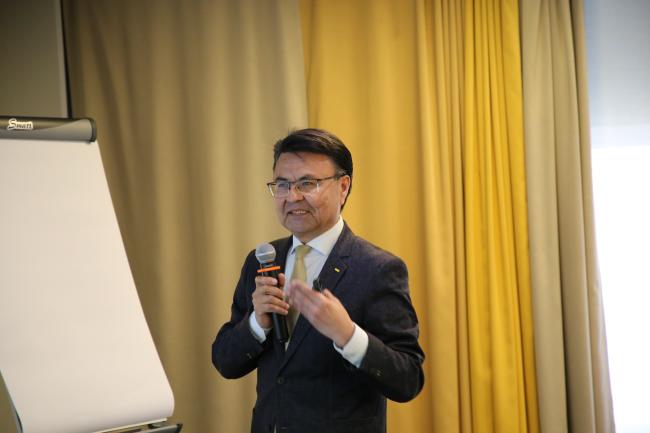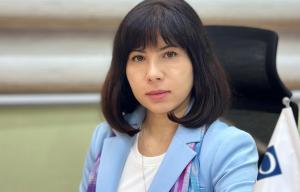Otabek Rashidov
Programme Officer - OSCE Secretariat

Please tell us about your professional background. Where have you worked before coming to the OSCE, and what were your responsibilities?
Before joining the Organization, I worked for six years as Political/Security Adviser to Japan’s International Co-operation Agency office in Tashkent after spending about ten years with the law enforcement agencies of Uzbekistan.
What is your academic background, and how does it align with the career you have developed?
My academic journey began with a Master’s degree in ICT and Applied Mathematics from Tashkent State University, which established a strong foundation in analytical thinking and technical proficiency. I furthered my studies with a Master of Public Administration from the University of York (UK), specializing in International Development, which provided me with a robust understanding of policy and governance. Most recently, I completed a Professional Master's Degree in Artificial Intelligence (AI) from the Rome Business School and the University of Valencia, equipping me with cutting-edge skills to tackle emerging security challenges in the digital age. I am now capable of independently developing AI-powered models that can be practically applied, including in the field of counter-terrorism. This blend of technical and policy-oriented education has been instrumental in shaping my approach to security and governance in international contexts.
Where are you based now, and what do you like most about your current job at the OSCE?
I joined the OSCE Secretariat in 2018 after working for seven years with the OSCE Project Co-ordinator in Uzbekistan, addressing issues such as illicit drug circulation, terrorism, and non-proliferation of weapons of mass destruction. In Tashkent, I was also in charge of implementing projects for the improvement of training systems for law enforcement bodies, border security and cyber security.
I am now based in Vienna as Programme Officer with the Action against Terrorism Unit of the Transnational Threats Department (TNTD/ATU).
I am responsible for the design and implementation of capacity-building activities as well as the overall co-ordination of the OSCE activities in Countering the Use of Internet for Terrorist Purposes. At TNTD, we have several thematic areas which are cross-cutting in nature. Interestingly, my portfolio also cuts across my practical work experience with law enforcement, international organizations, as well as my degrees.
As to the reasoning behind my joining the OSCE, I believe, this decision had been shaped for a number of years given my experiences with law enforcement and international development organizations. I think any individual, at some stage of his or her professional career, comes to the point when he or she wants to do concrete and real things to the world. At the OSCE, I feel that I am making a difference with my work.
While the Internet has had tremendous positive effects in our lives, tech-savvy terrorists are increasingly using communication technologies to fundraise, intimidate, train, radicalize, recruit and incite others to commit violent extremist and terrorist acts. Recent gruesome terrorist attacks showed how the design of online platforms can create and reinforce violent extremist beliefs. Confronted by political pressures, some countries call for social media providers to ramp up content removal and account deletion efforts against those who espouse violent extremism. Though the logic of this line of reasoning is fully understood, this approach runs the risk of resulting in regulatory frameworks which are technically unfeasible and unworkable, or in conflict with fundamental rights and freedoms.
My professional experience and understanding of contemporary online technological dynamics help me to develop and render comprehensive approaches in supporting OSCE participating states to improve the efficiency of their national efforts to deal with terrorists’ exploitation of the Internet. A guiding principle for addressing and finding such solutions needs to be anchored in the OSCE participating States’ commitments to uphold human rights, in particular the right to privacy, freedom of religion and belief, and freedom of expression, enshrined in various OSCE consensus documents. Here is a short video “Countering the Use of the Internet for terrorist purposes: Effective Responses” which I put together about this topic: https://youtu.be/jCaTL9x7lDg
From my point of view, the major advantage of the OSCE is that it offers platforms to share best practices and knowledge to facilitate international peace and security. Of course, there is no universal instrument or a so-called “silver-bullet” that would fit all countries across the board to a particular challenge. Each OSCE region, each country represents a particular context, conditioned by historical, cultural and socio-economic aspects. Methodologies and approaches that have successfully proven themselves in, say, Albania, may not work in Uzbekistan and vice versa. At the same time, OSCE is a unique place that can present “success stories” from one part of the world to other participating States for them to see if the approach that worked in one place could be used in other context after necessary adaptations and localizations. This does not only allow us to achieve set goals and objectives with a high degree of efficiency in the implementation of programmes, but also provides us with the opportunity to make the best use of limited financial and human resources, which is also increasingly important today.
What advice would you give to applicants considering a career in international civil service?
For anyone considering a career in international civil service, I recommend fostering a deep appreciation for diversity, as well as cultivating resilience and adaptability. Working internationally requires balancing technical expertise with cultural sensitivity and political awareness. A commitment to lifelong learning and a proactive approach to professional growth will serve you well, especially when facing the unique challenges of international policy-making. Embrace each opportunity, and you'll find fulfilment in both your personal and professional journey.
All in all, be always open to new challenges and be ready for lifelong learning. Take these two things with you for your journey and you will succeed.

